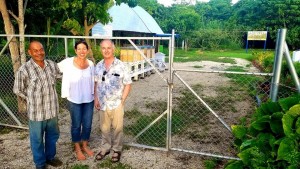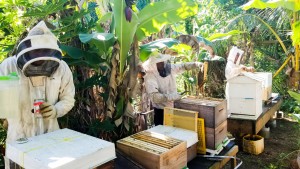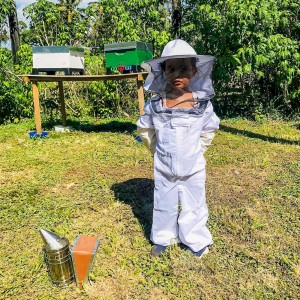Debra Allan never thought she’d become a beekeeper, but that was before her and Uili Lousi’s concerns about climate change and passion for their Pacific home led them to establish OHAI.
OHAI is an organisation located in Nuku’alofa, Tonga. It is dedicated to addressing the adverse effects of climate change and promoting resilience and capacity in the country and one of the keys to resilience is bees.

Lopeti Cocker, Debra Allan, and David Cramp onsite
“There’s a strong connection between bees and climate change,” says Debra, “it’s a matter of protecting our food security and our export crops. We need bees to have crop resilience.”
Worldwide, bees have been shown to increase crop yields by more than 60 percent. As Uili says “it’s a fundamental question of how did we go about choosing beekeeping as our first and principal project? It was because bees are very vulnerable globally as well and have declined in population in Tonga - without bees, we have no crops”.
Having made the decision to help the bees help Tonga’s food security, Uili and Debra worked on recruiting veteran beekeeper Lopeti Cocker. They describe him as the saviour of Tongan bees.
Lopeti says he got involved in OHAI because he has seen Tonga’s bee population decline. “I’ve found out while working with the bees for 32 years - once I could easily see bees as I drove along the road and looked on the fields, now it is very difficult to find them.”

OHAI Beekeepers, Nuku'alofa
With Lopeti on board, OHAI went to VSA for support. And support came in the form of beekeeper David Cramp, who arrived in Tonga in 2019 to help set up the hives. On his return to New Zealand he worked remotely, Zooming in online from his home in Wellington.
David and the team have trained 30 Tongan beekeepers. It’s a win/win for beekeepers who are often also farmers - they are ensuring the future of their crops and developing new products from honey and wax.

Junior Beekeeper Ayana Hala'api'api. Tonga
Hives are now starting to be set up at other locations in Tonga to allow beekeepers to manage them independently.
Things are going so well that there are now enough trained beekeepers to start BATI - the Beekeepers Association of Tonga, and graduates of the course are building and populating their own hives.
For Debra, Uili, and Lopeti the role of bees as pollinators is the main outcome. They are working to ensure the bees have year-round food and are creating a resource to help.
“Of course, because the Tongan climate is very distinct during summer, spring, autumn, and winter the availability of flowers for the bees to scavenge on is variable,” says Lopeti, “which is why through the life of the hives we have to check from time-to-time to be sure that the bees have enough food.”
Uili says getting the community onboard is key to sustainability. “We are looking for partnerships with other local organisations here in Tonga so the bees can have enough food every season.”
In a short time, and against the odds, during 2019-2021 the Tongan bee industry has flourished. There is much to do yet to ensure farmers’ crops are sustainable. Support for this critical step in agriculture goes a long way towards food security and growing export income for the people in Tonga.
You can find out more - www.ohaitonga.org
